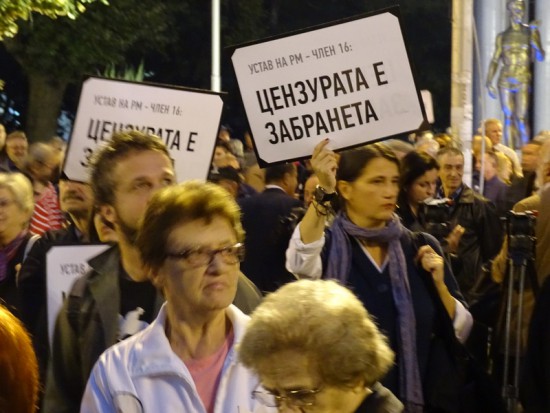Macedonia ‘Censorship Bill’ Shelved Amid Protests
Parliament withdraws controversial bill banning publication of material related to mass surveillance claims, as anti-government protesters rally in Skopje.
The Macedonian Parliament has confirmed a controversial government-backed bill that would have criminalised the publication of material related to allegations of mass unlawful wiretapping has been withdrawn. Parliament announced the bill had been withdrawn in a written statement issued late Wednesday evening, as hundreds of demonstrators rallied outside the parliament building in the capital city Skopje. Breaches of the proposed law would have been punishable by up to four years in jail. Claims of mass unlawful surveillance emerged after opposition leaders began publishing recordings in February that they say reveal the government’s direct involvement in election fraud, the justice system and the media.
The ruling parties said they proposed the ban on publication of any material related to the scandal in order to prevent its misuse, but critics claim the move was designed to silence opponents and protect government interests. “You cannot ban the ‘bombshells’ [the batches of tapes purportedly showing incriminating conversations between officials published by the opposition],” Biljana Bejkova, a human rights activist with Skopje’s NGO-Info Centre, told protesters at Wednesday’s rally. “They are a testimony of what has been happening in the past years, how this government abused its power, how it broke our rights, how it eavesdropped our everyday life.” The protest was organised by an informal coalition of non-governmental organisations calling itself AJDE! [Come On!] – Platform for Civil Policies and held under the slogan: “Censorship is forbidden! Defend the truth!”
“This law is barbaric… It can have terrible consequences”, said Ljubomir Frckoski, a constitutional law professor at Skopje’s St Cyril and St Methodius state university and former opposition presidential candidate. He said that the draft law contravenes basic democratic principles that are enshrined in the constitution, such as the ban on censorship and the ban on retroactive application of laws. Frckoski described the bill as “absurd”, and cited provisions that would have attempted to ban publishing material linked to the wiretapping scandal abroad, even though the Macedonian parliament has no jurisdiction outside the country.
Legislators from the main ruling VMRO DPMNE party and their coalition partner, the Democratic Union for Integration, DUI, confirmed they had submitted the bill on Tuesday and added that if passed, the law would mean materials released thus far would have to be removed from media outlets.
 |
| Photo by: Sinisa Jakov Marusic |
Parliament removed the bill following pressure at EU and US facilitated talks between Nikola Gruevski’s government and the opposition to put this issue aside temporarily and focus instead on a package of urgent electoral reforms. The US Embassy in Skopje, which has been closely involved in talks between government and opposition leaders, issued a written statement on Wednesday confirming the parties had agreed to delay the law, consider it in conjunction with proposed legislation on whistle-blower protection and “resolve such issues before October 20”.
“These laws raise critical questions regarding freedom of expression, citizens’ rights to privacy, and good governance, all of which should be addressed in accordance with Macedonia’s international commitments,” the embassy said. The talks on the electoral model and other reforms that need to be implemented ahead of April’s General Election are part of the EU-brokered political deal reached this summer, aimed at ending the political crisis in Macedonia that was sparked by the unlawful mass surveillance claims.
The opposition claims that tapes they have been releasing since February show that Prime Minister Gruevski was behind the illegal surveillance of some 20,000 people, including ministers. Gruevski, who has held power since 2006, has strongly denied the charges and insists the tapes were “fabricated” by unnamed foreign intelligence services and given to the opposition to destabilise the country.
07 October 2015

